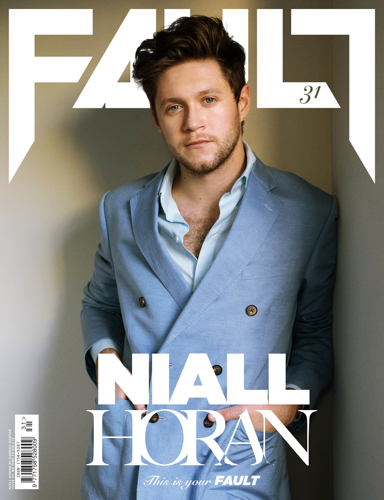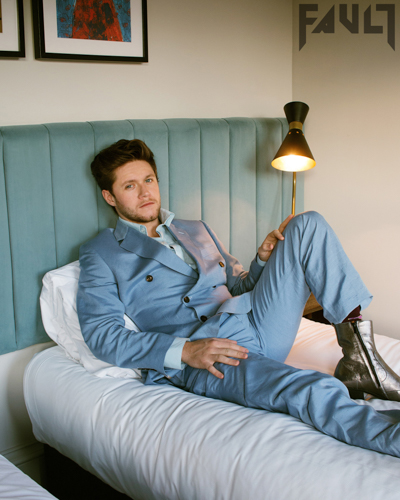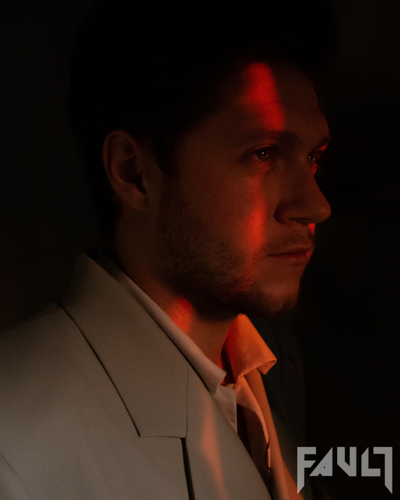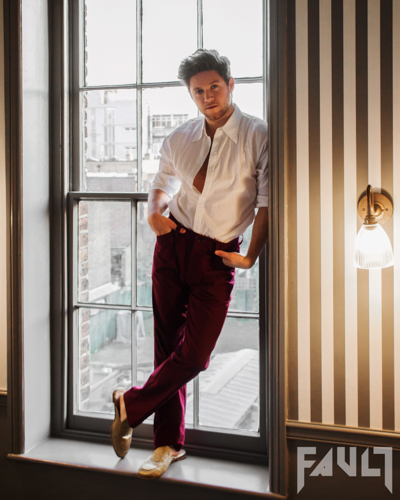Niall Horan Photoshoot and Interview for FAULT Magazine Issue 31 preview

Photography: Hanna Kantor
Creative Direction: Edith Walker
Styling: Manny Lago
Grooming by Emma White Turle at The Wall Group using Codex Beauty and FFOR Hair
Styling Assitant: Gismarynd
Shoot on location at Aragon House Hotel
Interview: Miles Holder
While Niall Horan has been in the spotlight for many years, it was his debut album Flicker which truly introduced audiences to who he was as a solo artist. The album spawned five singles with hit ‘Slow Hands’ being the breakaway track that dominated airwaves across the globe.
While a multi-instrumentalist with a shivers-inspiring rasp to his singing tone – it’s Niall’s impeccable songwriting that sets him apart from his contemporaries. His knack for storytelling allows him to be truly vulnerable, letting audiences see into his life of romance and heartbreak all through clever lyricism atop infectious beats.
While there are countless interviews with Niall out there, I didn’t want simply focus on his memories of his former band or revel in soon to be forgotten tabloid fodder. Today meet Niall the songwriter, the musician with an album full of heart and a man, like all of us, not without his FAULTS. Enjoy.
Tell me about your first day of writing for this album.
Niall Horan: ‘Heartbreak Weather’ was the first thing I wrote down on the page when I started writing the album and it even made it onto the final product as a single. I didn’t want to put myself into any particular genre with this record, I just wanted to go in and write what I thought were good pop songs and not overthink the thing.
What changed about your writing process between Flicker and Heartbreak Weather?
Niall Horan: Well, it’s a break-up album which was very new for me and I didn’t intend for it to be that way when I started, but I think as songwriters we write about our lives and feelings and it just happened.
In a way, everything about my writing process changed. I was used to sitting with a guitar and just writing but we switched over to the piano for this one and it was a whole new perspective. I went in with no plans on what I wanted to write about, I just knew I had to write without overthinking, or questioning every lyric or the production of every song. Throughout the album, there’s ups and downs and all it’s over the place, but that’s what I wanted it to be.
Did you find writing a breakup album was a therapeutic experience or did it just drudge up sad memories?
Niall Horan: I think when you make a breakup album, you can either write a bunch of songs that make you feel sorry for yourself or you can play around with it and make songs for all the emotions that you go through because it’s not all upsetting. With any relationship, there are fun moments and there are days when you feel like you’re in a music video with the rains pouring outside as you watch crying through the window.
When you go through a breakup you process the whole relationship and think back to amazing nights times together and the bad ones and I wanted that for this album. I wanted to show the full narrative and create a different kind of breakup album.
While you’ve released a lot of music over your career, this will be your second solo album and with Flicker being so successful, did you feel pressure to match and exceed expectations?
Niall Horan: This time it was very second album syndrome where you’re worried about it doing so well. You can let the pressure get into your head or you can grab it by the horns and I’m going with the latter. I’ve released so much music by now and I know it’s scary but you have to enjoy the process. If you overthink every time you go into the studio, you’re never going to enjoy it.

It’s a very personal album, do you ever fear to let so many of your fans but also your critiquers inside your personal life and the scrutiny that might come from it?
Niall Horan: I don’t anymore, I used to really care about what people thought the songs were about and stuff but there comes a time when you have to let it go. There are so many songs in history that I love and could not tell you what or who they’re written about. It’s ambiguous and people can make their narratives and connect the songs to something in their own lives instead of worry and speculating who I’m writing about.
I write to get it off my chest and journalists can do what they want and the fans can do the same and if they can attach it to themselves in some way then all the better for them.
Does the fact that Heartbreak Weather doesn’t fit into a certain genre of music harms or helps you?
Niall Horan: The person who has been a big influence on me is Billie Elish. Previously I’d go into sessions with pop songwriters and they’d tell me my melodies are too bluesy and rock and roll. But then I listen to Billie Elish’ ‘when the party’s over’, one of the best ballads and the ways she sings it is so bluesy and nuanced but it’s still a pop song. She’s proven that it can be done and she’s broken down barriers for other songwriters, it’s scary to think she’s only 18. It inspires me to keep going and to do something different.
What’s something you want to write about but haven’t yet?
Niall Horan: I’ve had days where I knew what I wanted to write but then I got writer’s block and couldn’t. For the most part, I’ve managed to get it done though. As I’ve gotten older, it’s a lot easier for me to write about things and maybe for a next project I can write about political subjects but for now, I’ve gotten everything out that I needed to.

So I’m conscious that you’ve given a million interviews and I wanted to make sure that I only asked you unique ones so in that vein, what is something you’ve never been asked but is something you’ve always wanted to say?
Niall Horan: Oh god, this question! I spend a lot of time answering questions that have nothing to do with music and sat and spoken sh*t about people I’ve gone out with or my favourite colour and what my muse is and it’s like “I did just spend a year in a studio, can we talk about that!? Please?” In saying that, I don’t actually have an answer to this question!
If you could go back to the start of your career and leave yourself a piece of advice, what would it be?
Niall Horan: I’d tell myself to not be scared to just be me. When the band finished, there was a chance I would go down the middle of the road and make the middle of the road pop songs. The way I’ve done it, I’m proud of myself. I’m not a rebel but I wanted to do something different and not stick to what was expected to me. That’s something I’m proud of myself for doing.
Also just to get ready, because it’s going to be crazy and get ready for the scrutiny and be strong when it comes. A lot of time people are waiting for you to fall and it’s how you keep yourself up because even though you’re at the top, you do still become very deflated.

It’s great advice but also very easier said than done for younger musicians. How did you ensure that the Niall we see today is the real you and not the artist “the industry” wanted you to be?
Niall Horan: I’ve never let people pull the wool over my eyes, I don’t take bullsh*t. I’ve only ever released something if I thought it was me or done photoshoots that felt like me. I’ve just tried to grow the artist in me because first off I’m a songwriter through and through. I’ve not let people pull me in any direction, they know that I won’t release something if I don’t like.
What is your FAULT?
Niall Horan: I’m a bad communicator in relationships. I struggle to talk about things. I don’t like to let things build up in me and songwriting does help get it out but it can happen too late.
Also, I’m bad at being a “celebrity” probably because I don’t like to think of myself as a celebrity. I’m a normal fella with the same faults as everyone else!
CLICK HERE TO PRE ORDER THE FULL INTERVIEW AND COVER SHOOT WITH NIALL IN FAULT MAGAZINE 31
[…] former One Directioner spoke to FAULT magazine about how breakups influenced his music, and why they don’t have to be ‘all […]
[…] former One Directioner spoke to FAULT magazine about how breakups influenced his music, and why they don’t have to be ‘all […]
[…] former One Directioner spoke to FAULT magazine about how breakups influenced his music, and why they don’t have to be ‘all […]
[…] can read the full interview here. What does everyone think of the new […]
[…] former One Directioner spoke to FAULT magazine about how breakups influenced his music, and why they don’t have to be ‘all […]
[…] former One Directioner spoke to FAULT magazine about how breakups influenced his music, and why they don’t have to be ‘all […]
[…] former One Directioner spoke to FAULT magazine about how breakups influenced his music, and why they don’t have to be ‘all […]
[…] former One Directioner spoke to FAULT magazine about how breakups influenced his music, and why they don’t have to be ‘all […]
[…] former One Directioner spoke to FAULT magazine about how breakups influenced his music, and why they don’t have to be ‘all […]